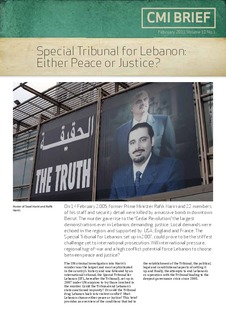| dc.description.abstract | On 14 February 2005, former Prime Minister Rafik Hariri and 22 members of his staff and security detail were killed by a massive bomb in downtown Beirut. The murder gave rise to the “Cedar Revolution,” the largest demonstrations ever in Lebanon, demanding justice. Local demands were echoed in the region, and supported by USA, England and France. The Special Tribunal for Lebanon, set up in 2007, could prove to be the stiffest challenge yet to international prosecution. Will international pressure, regional tug-of-war and a high conflict potential force Lebanon to choose between peace and justice?
The UN criminal investigation into Hariri’s murder was the largest and most sophisticated in the country’s history and was followed by an international tribunal, the Special Tribunal for Lebanon (STL, hereafter the Tribunal), set up in 2007 under UN auspices to try those involved in the murder. Could the Tribunal end Lebanon’s state-sanctioned impunity? Or could the Tribunal drag Lebanon back into violent conflict? Must Lebanon choose either peace or justice? This brief provides an overview of the conditions that led to the establishment of the Tribunal, the political, legal and constitutional aspects of setting it up and finally, the attempts to end Lebanon’s co-operation with the Tribunal leading to the deepest governance crisis since 2005. | |
